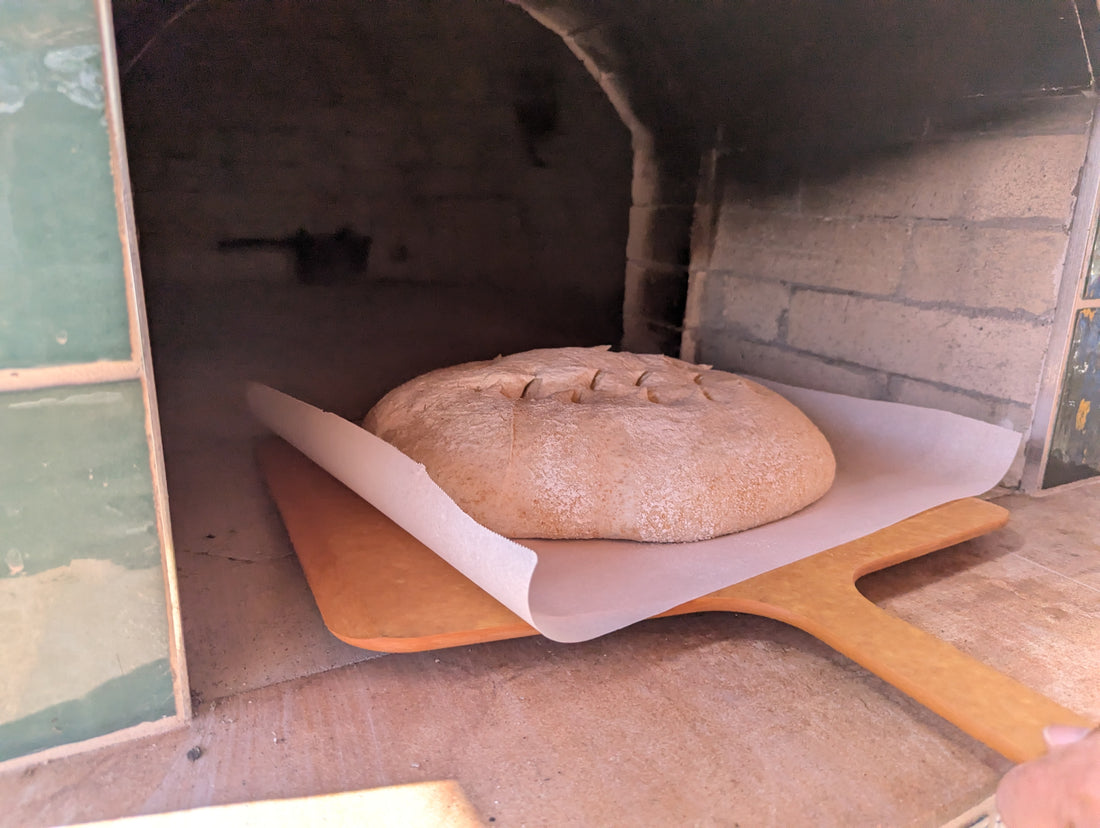
High-Altitude Bread Baking Adjustments: Practical Tips for Bakers
Share
Baking Bread at 5,000 Feet and Higher
At Sherwood Coffee 'n' Bread, our outdoor bread-baking classes in Albuquerque often come with a unique challenge: high altitude. Sitting at 5,000 feet above sea level, Albuquerque's elevation can make bread baking tricky, especially for those used to sea-level recipes. From overproofing to dough hydration issues, students often ask us how to adjust their baking techniques to achieve that perfect loaf.

If you're baking bread at high altitudes and facing frustrating results, don’t worry! Here are practical, tried-and-true tips to help you master bread baking above sea level.
Why High Altitude Affects Bread Baking
At higher altitudes, the air pressure is lower, which causes several challenges when baking bread:
- Faster Rising Times: Dough ferments and proofs more quickly, increasing the risk of overproofing.
- Higher Evaporation Rates: Water evaporates faster, affecting dough hydration and making it drier.
- Temperature Sensitivity: The boiling point of water is lower, and maintaining consistent dough temperature can be trickier.
Understanding these challenges is the first step toward making adjustments that will yield consistently excellent bread.
Practical Tips for High-Altitude Bread Baking
1. Adjust Dough Hydration

High-altitude environments have lower humidity, which can dry out your dough.
- Solution: Increase your dough hydration by adding 5-10% more water than the recipe calls for. For example, if your recipe calls for 500 g of water, try adding an extra 25-50 g.
- Tip: Add water gradually and observe the dough's consistency to avoid overhydrating.
- Tools: Easily perfect your dough with our Bread Dough Hydration Calculator – a simple tool to help you achieve the ideal hydration for any bread recipe.
2. Control Fermentation Times

Fermentation happens faster at high altitudes, which can lead to overproofed dough.
- Solution: Shorten your fermentation times or use less yeast (reduce by about 25%) or, if baking with sourdough, use less starter (reduce by about 25-30%) to slow down fermentation and prevent overproofing.
- Tip: Use the refrigerator for cold fermentation or retarding to slow down the process and develop more flavor.
3. Use Cooler or Warmer Water for Dough Temperature Control
Maintaining an optimal dough temperature of 78°F (25°C) is crucial.
-
Solution:
- In summer, use slightly cooler water (around 65-70°F) to prevent overheating the dough.
- In winter, use slightly warmer water (around 85-90°F) to maintain the right dough temperature.
4. Adjust for Whole Wheat and Rye Flours
Freshly milled whole wheat and rye flours absorb more water, especially at high altitudes.
- Tip: When using these flours, increase hydration by an extra 5-10% to prevent a dry, dense loaf.
5. Strengthen the Dough with More Kneading

The lower air pressure at high altitudes can result in weaker gluten structure.
- Solution: Add an extra 1-2 minutes of kneading or incorporate an additional stretch-and-fold during bulk fermentation to strengthen the gluten network.
6. Bake at a Slightly Higher Temperature
High-altitude air is thinner, affecting heat transfer in your oven.
- Solution: Increase your baking temperature by about 25°F (10°C) to achieve good oven spring and a crisp crust.
7. Use Diastatic Malt Powder
Diastatic malt powder can improve crust color and texture, which can be a challenge at high altitudes.
- Tip: Add 1 teaspoon of diastatic malt powder per 500 g of flour to enhance browning and flavor.
- Shop: You can buy diastatic malt powder at specialty baking stores, health food stores, or online retailers like King Arthur Baking, Bob’s Red Mill, and Amazon.
8. Experiment with Steam
Steam helps with oven spring and crust formation, which can be trickier at high altitudes.
- Tip: If baking at home, use a Dutch oven or place a pan of water in the oven to introduce steam during the first 10-15 minutes of baking.
Why These Adjustments Matter

Applying these tips can make a significant difference when baking bread at high altitudes. You’ll be able to produce loaves with the ideal balance of crust, crumb, and flavor, even in challenging conditions.
At Sherwood Coffee 'n' Bread, We Understand the Challenge

At Sherwood Coffee 'n' Bread, we specialize in helping bakers conquer high-altitude challenges and perfect their artisan bread skills. Our hands-on classes in Albuquerque, featuring a traditional brick oven, provide the techniques, tips, and community support you need to bake exceptional bread at 5,000 feet.
We love incorporating freshly milled whole wheat flour into our breads, using long fermentations and cold retarding to enhance flavor and digestibility. Baking in a brick oven adds a unique touch that elevates every loaf.
Many of our students have successfully tackled high-altitude baking with our guidance, and you can too! Check out our full lineup of Baking Classes in Albuquerque - we can’t wait to bake with you and share the joy of artisan bread.

1 comment
I have no idea how to calculate 15% of my flour. Can you just tell me how many teaspoons or tablespoons of water to add for 2 cups of all purpose flour with one cup of whole wheat flour, which is what I use for my high altitude, basic bread recipe?